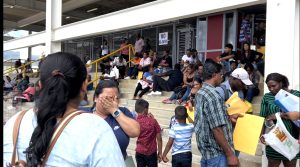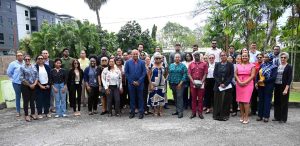By Sue-Ann Wayow
CARICOM leaders are calling for the death penalty to be enforced in the Caribbean as well as an overhauling of the judicial system which they said are key deterrent factors to crime.
And do not give a murder charged person bail, they appealed.
As the first day of the regional symposium on violence as a public health issue ended on Monday, the leaders sought to have intense conversations on crime that is now plaguing Caribbean countries.
The Regional Symposium: Violence as a Public Health Issue-The Crime Challenge is being hosted by Trinidad and Tobago over a two day period at the Hyatt Regency Hotel in Port of Spain and is a joint venture between Caricom and the T&T Government.
On the issue of the death penalty, Prime Minister of the St Vincent and the Grenadines Ralph Gonsalves had criticisms for both the judiciary and the Roman Catholic Church for opposing the death penalty.
Confessing that he himself was a Roman Catholic, his mother who was a Legion of Mary taught him that countries should not have the death penalty.
However, both his mother and the Pope were wrong in that regard, he said.

Gonsalves said, “For murder, other than a crime of passion, you should get the death penalty. And if the Europeans don’t like that… they had it for a long time… and they may not want to bring it back… If we have that as a particular option for punishment and for the courts not to make it virtually impossible to carry out the death penalty.”
That was the tavern talk in all the Caricom countries, the Prime Minister said.
On the issue of the judiciary, Gonsalves said, “Too many of our judges and magistrates are too soft. Sometimes you get the impression that some magistrates, depending on who is the lawyer, their clients seem to get better treatment.”
That was the talk behind closed doors but he said discussions needed to be made public about those issues.
With lots of resources being pumped into crime-fighting measures, the regional laws needed to be updated, Gonsalves added.
On the matter of bail Gonsalves asked, “How could you go and give somebody who is charged with murder, bail? Let’s be serious! Where do those judges live? On Mars?”
Barbados Prime Minister Mia Mottley also questioned why persons were allowed to commit more than one murder after they were released on bail.
She said, “Now when I look at the stats, not just out of the Bahamas, Barbados and all through the region, the people who are causing the greatest problems are charged with two, three, four murders. Something is fundamentally wrong.”
Mottley continued, “So I ask myself two basic questions. How are we going to deconstruct and reconstruct to meet the reality of this jurisprudential development that is undermining the rule of law in our countries and we are going to have to find ways of cooperating from the level of the police to the level of the courts, but in particular, forensics.
“If we can get people to court within nine to 12 months, you have a good chance of a person not being given bail. Beyond 12 months, any number can start to play.”
Mottley called for a regional forensic lab questioning why countries have been establishing forensic labs individually.
The Barbadian Prime Minister also said that a Caricom arrest was needed as well as the rotation of judges and magistrates in the region to ensure that there is not the familiarity with counsel and others in the judicial system.
She is hoping that by the end of the symposium on Tuesday, that concrete recommendations and decisons will be adopted by Caricom leaders on the issue of violence as a public health issue.
Also speaking at the symposium on Monday was T&T’s Prime Minister Dr Keith Rowley, Prime Minister of the Bahamas Philip Davis and Jamaica’s Prime Minister Andrew Holness.
Trinidad and Tobago’s Opposition Leader Kamla Persad-Bissessar was also in attendance of the opening ceremony of the symposium along with Opposition Members of Parliament.
![]()













